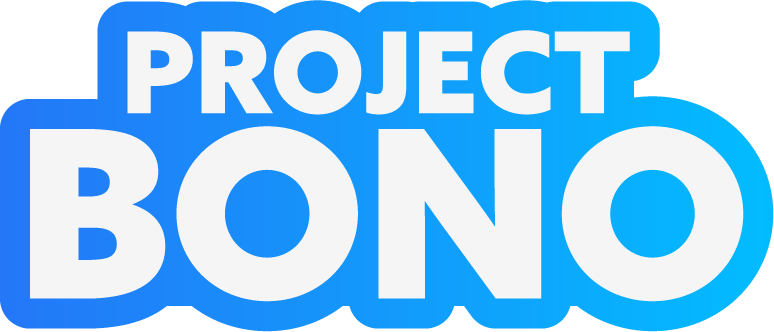
Project Bono Disrupts Traditional Substance Abuse Education
Discover how our approach to court-ordered courses is disrupting antiquated programs and offering communities a unique value proposition.
Introduction
Substance abuse continues to be a significant problem in communities across the United States, resulting in a range of negative consequences for individuals, families, and society as a whole. One of the most effective ways to address this issue is through education and prevention programs, which can help individuals understand the dangers of drugs and alcohol and reduce their risk of becoming addicted.
However, traditional substance abuse education programs have been criticized for being expensive, inflexible, and inadequate in addressing the complexity of the problem.
Enter Project Bono, an innovative online court-ordered course program that is shaking up the traditional substance abuse education landscape. With our unique value proposition of redirecting 25% of enrollment proceeds back to the communities that assign our programs in order to provide enrichment, Project Bono is not only helping individuals overcome addiction but also contributing to the betterment of your community.
Table of Contents
Introduction
Flexibility and Convenience
Evidence-based Content
Impact on Recidivism
Community Enrichment
Innovation and Impact
Conclusion
Flexibility and Convenience
One of the biggest advantages of Project Bono’s online education program is its flexibility and convenience. Unlike traditional in-person classes, which can be difficult for individuals to attend due to work, family obligations, or lack of reliable transportation, Project Bono’s courses can be taken at any time and from anywhere. This allows individuals to fit their education into their busy schedules and complete the program at their own pace.
Additionally, Project Bono’s online format also allows court administrators to assign the program to a larger number of individuals, which can help reduce the burden on the legal system. And with a variety of time requirements and topics such as Drugs & Alcohol Awareness, Cannabis Education, Minor in Possession (MIP), Nicotine Prevention, Bullying Prevention, Anger Management, Theft Prevention, and more, Project Bono offers a diversified curriculum that can meet the needs of different individuals.
Additionally, Project Bono’s online format also allows court administrators to assign the program to a larger number of individuals, which can help reduce the burden on the legal system. And with a variety of time requirements and topics such as Drugs & Alcohol Awareness, Cannabis Education, Minor in Possession (MIP), Nicotine Prevention, Bullying Prevention, Anger Management, Theft Prevention, and more, Project Bono offers a diversified curriculum that can meet the needs of different individuals.
Evidence-based Content
At Project Bono, we understand the importance of providing accurate and reliable information to our students, and that's why we use credible sources when authoring our court-ordered courses such as peer-reviewed research, scholarly journals, and reputable organizations such as the National Institutes of Health, National Institute on Drug Abuse, United States Food and Drug Administration, Harvard Health Publishing, Centers for Disease Control and Prevention, and more.
In addition, we believe in keeping our courses up-to-date with the latest research, laws, and best practices in the field of substance abuse education. As new information becomes available, we consistently review and update our courses to ensure that our students are receiving the most accurate and relevant information. This dedication to evidence-based content is mirrored in our approach to measuring program effectiveness.
By regularly evaluating the effectiveness of our program, we can identify areas for improvement and make adjustments as needed to ensure that our students are receiving the best education possible.
Our focus on consistent updates and utilizing evidence-based and credible sources are what sets us apart from other substance abuse education programs and ensures that our students receive the most accurate and reliable information available.
In addition, we believe in keeping our courses up-to-date with the latest research, laws, and best practices in the field of substance abuse education. As new information becomes available, we consistently review and update our courses to ensure that our students are receiving the most accurate and relevant information. This dedication to evidence-based content is mirrored in our approach to measuring program effectiveness.
By regularly evaluating the effectiveness of our program, we can identify areas for improvement and make adjustments as needed to ensure that our students are receiving the best education possible.
Our focus on consistent updates and utilizing evidence-based and credible sources are what sets us apart from other substance abuse education programs and ensures that our students receive the most accurate and reliable information available.
Impact on Recidivism
Substance abuse education programs like Project Bono have consistently been shown to have a positive impact on recidivism rates, with individuals who complete such programs being less likely to reoffend than those who do not. Project Bono’s programs are no different.
In addition to providing evidence-based education, our unique value proposition of redirecting 25% of enrollment proceeds back to the communities that assign our programs in order to provide enrichment, sets us apart. This not only helps individuals overcome addiction but also contributes to the betterment of the community further reducing rates of recidivism.
Community Enrichment
By redirecting 25% of enrollment proceeds back to the communities that assign our programs, Project Bono is able to alleviate burdens on taxpayers and redirect funds from illegal activities into philanthropic efforts.
This community engagement approach is not only beneficial for the community but also for the individuals who are assigned to take our program. It shows that the community cares about their well-being and are invested in their recovery, which can be a powerful motivator for individuals to take the program seriously and make a real effort to change their behavior.
This community engagement approach is not only beneficial for the community but also for the individuals who are assigned to take our program. It shows that the community cares about their well-being and are invested in their recovery, which can be a powerful motivator for individuals to take the program seriously and make a real effort to change their behavior.
Innovation and Impact
The innovative approach to substance abuse education utilized by Project Bono is having a real impact on individuals, communities, and legal systems. Project Bono is disrupting the traditional substance abuse education landscape and helping to address the complex problem of substance abuse in a more effective and efficient manner through its flexibility, convenience, evidence-based content, and community enrichment.
We hope to provide even more innovative resources for educating individuals on harmful substances and behaviors as we continue to improve and expand our curriculum over time, and to fulfill our mission of improving the way communities and legal systems interrelate through greater community involvement as we evolve.
Conclusion
Substance abuse is a complex issue that requires a multifaceted approach to address. Project Bono’s online court-ordered education program is disrupting the traditional substance abuse education landscape with its innovative approach, flexibility, evidence-based content, community engagement and ability to reduce recidivism rates. It’s not only beneficial for the individuals assigned to the program but also for the community as a whole. Project Bono is showing that it is possible to make a real difference in addressing substance abuse and making communities safer and healthier.
Page last updated: January 24, 2023
OUR COURSES
Drag to resize

Project Bono provides the most affordable up-to-date online classes that fulfill court and employer mandates while contributing 25% of proceeds towards charitable causes.
SOCIAL LINKS
RESOURCES
-
About Us
-
Print a Referral
-
Example Certificate
-
Where We're Accepted
Drag to resize
SUPPORT
Drag to resize


Copyright © 2024 Project Bono. All Rights Reserved
Money-Back Guarantee
All of our courses are backed by a 30-day money-back guarantee. If your certificate of completion is not accepted, contact us with proof of decline.
We recommend you confirm that your assigner will accept our certificates before you enroll in any of our courses.
Note: Cryptocurrency payments do not qualify at this time.
We recommend you confirm that your assigner will accept our certificates before you enroll in any of our courses.
Note: Cryptocurrency payments do not qualify at this time.
Drugs & Alcohol
MIP
Anger
Truancy
Cannabis
Bullying
Theft
Nicotine
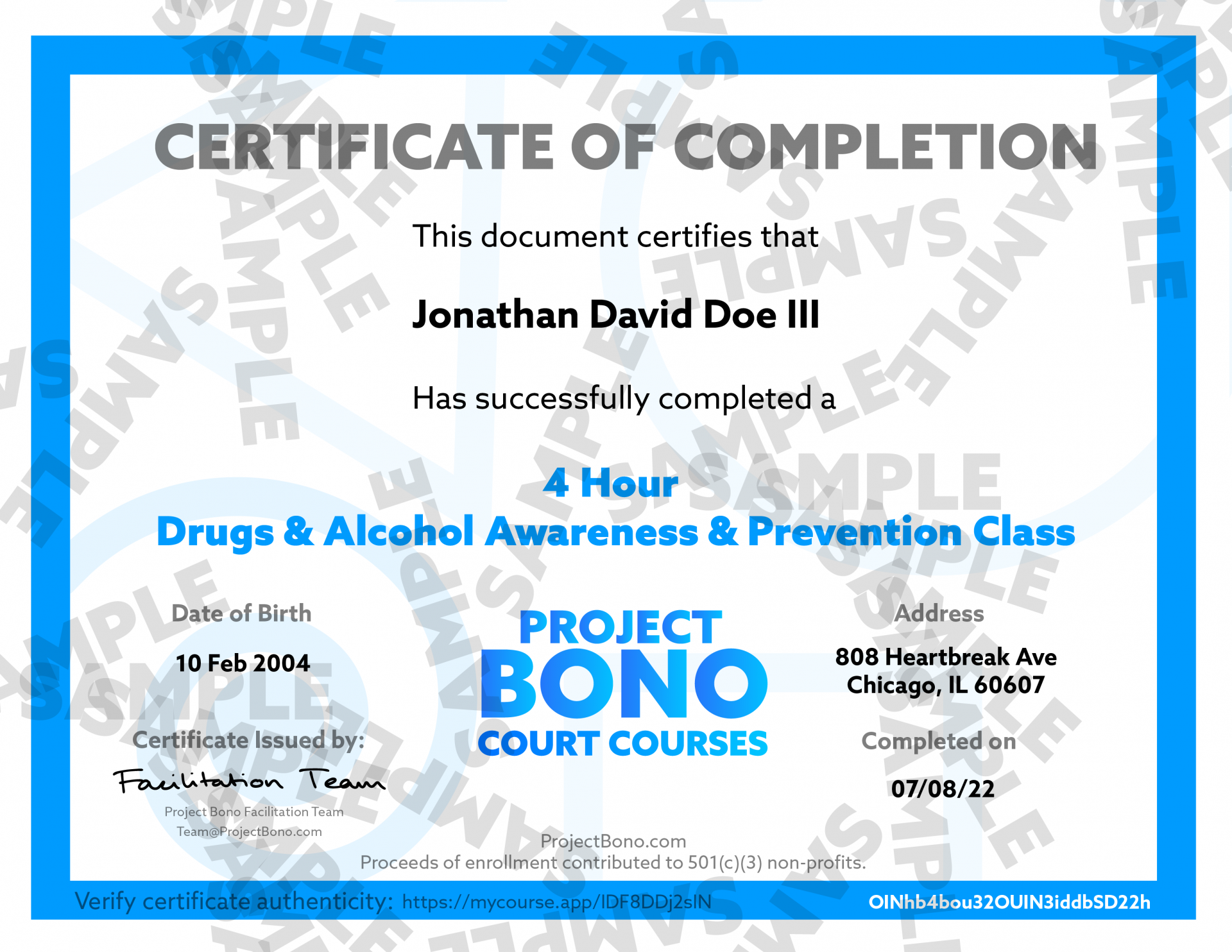
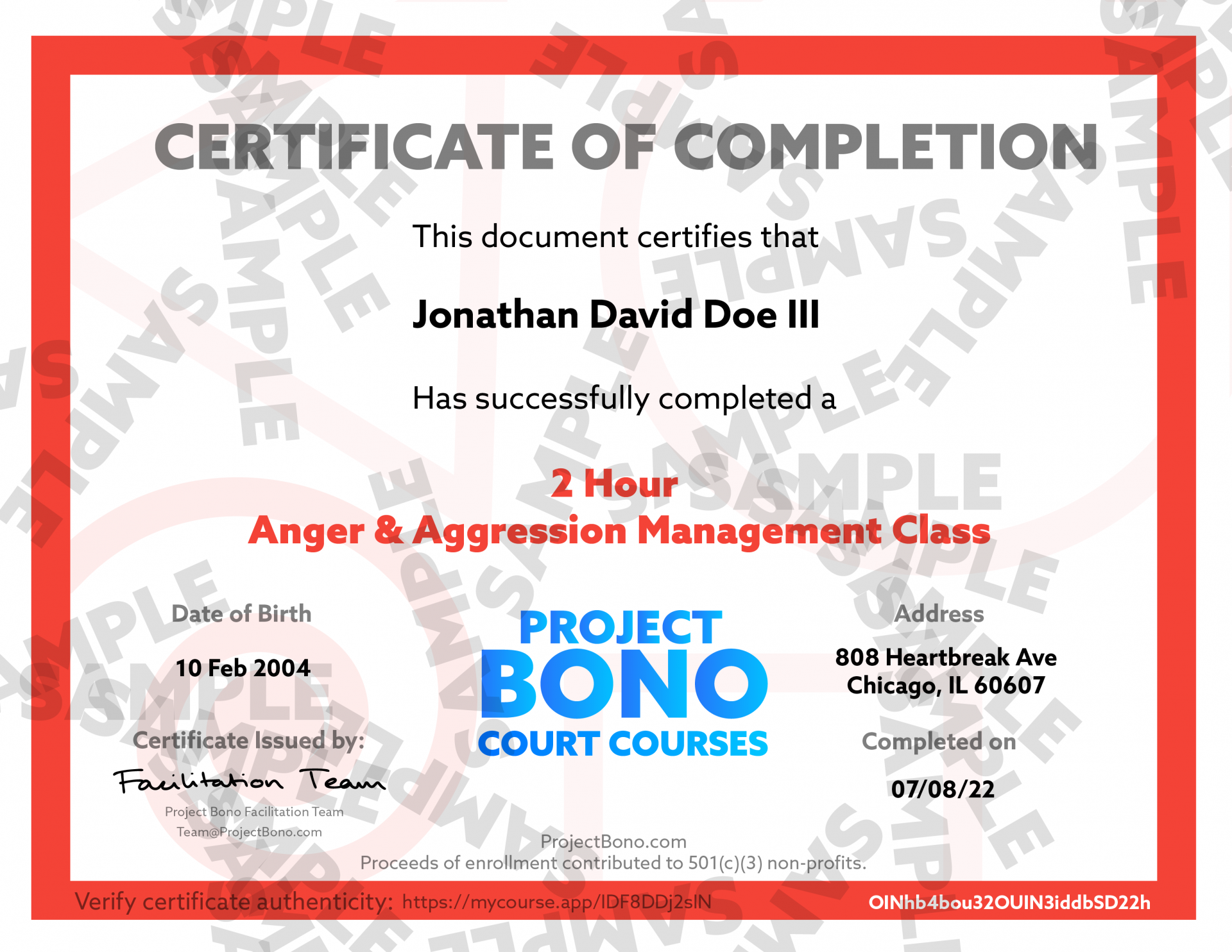
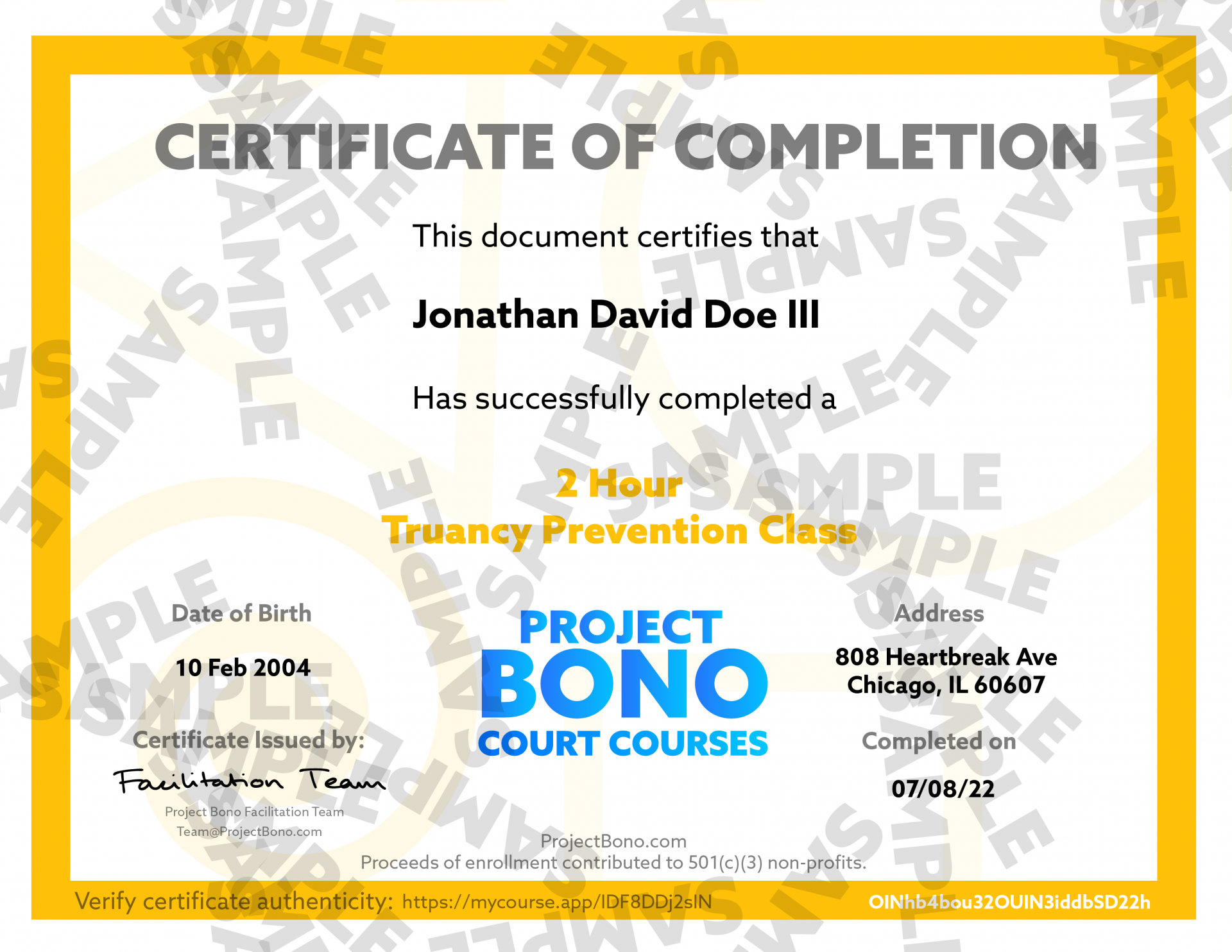
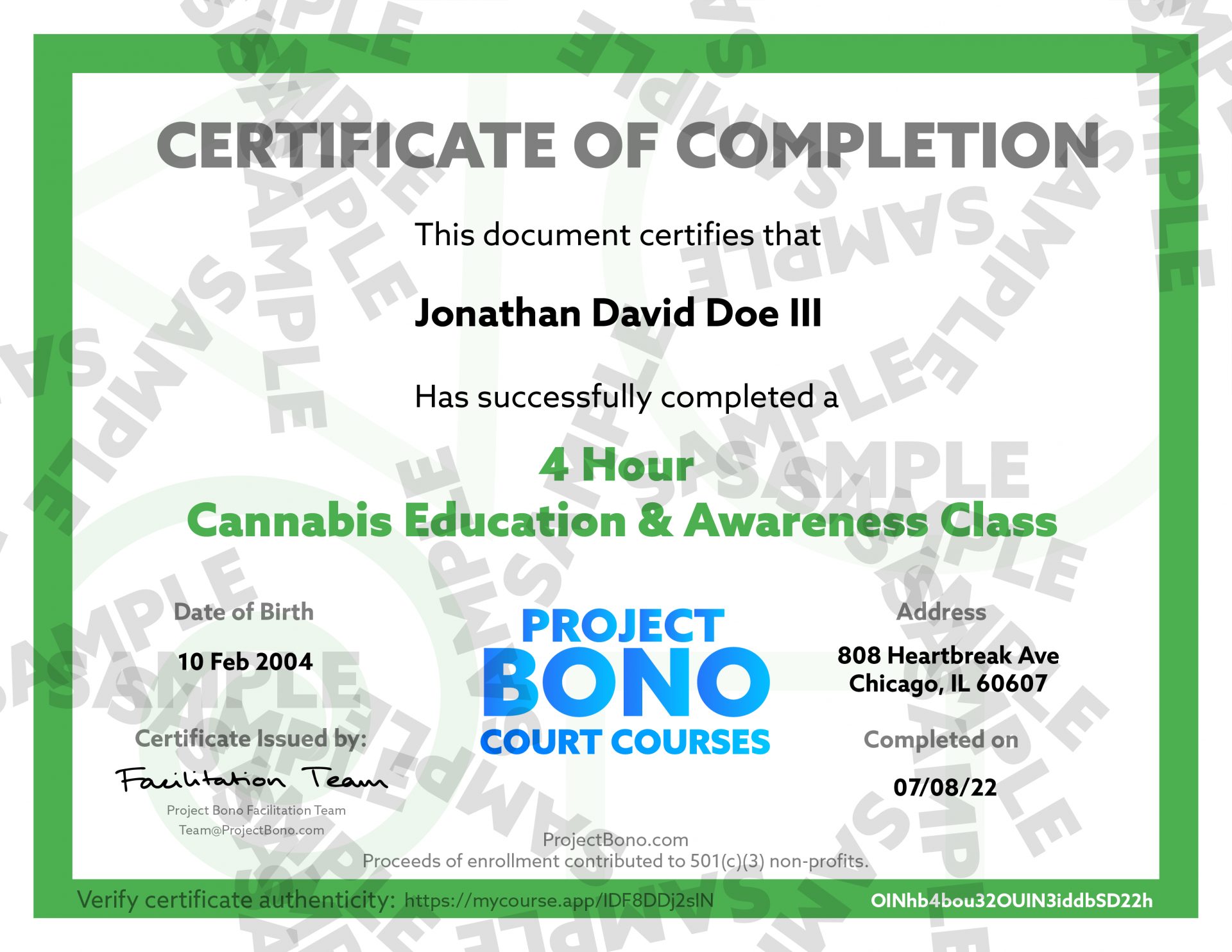
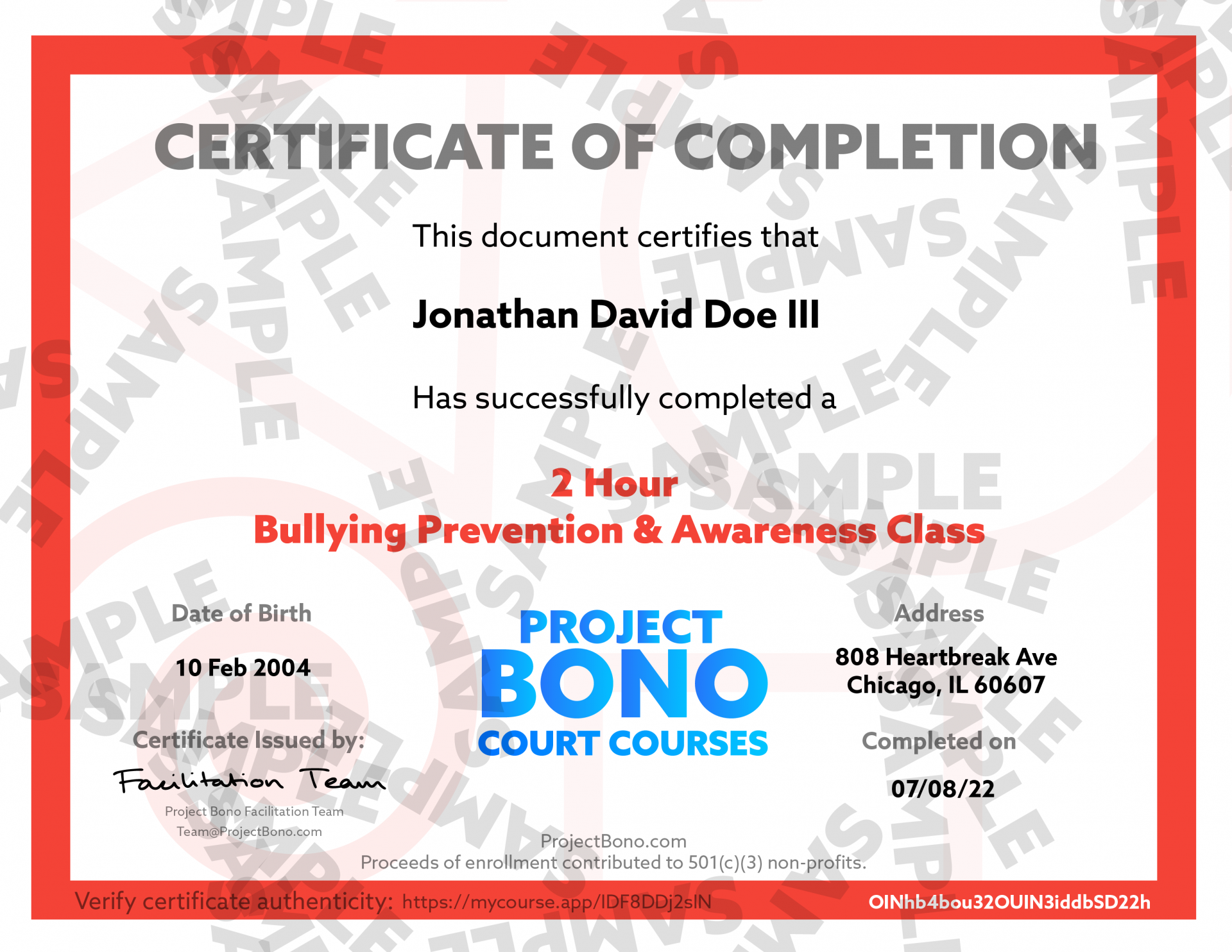
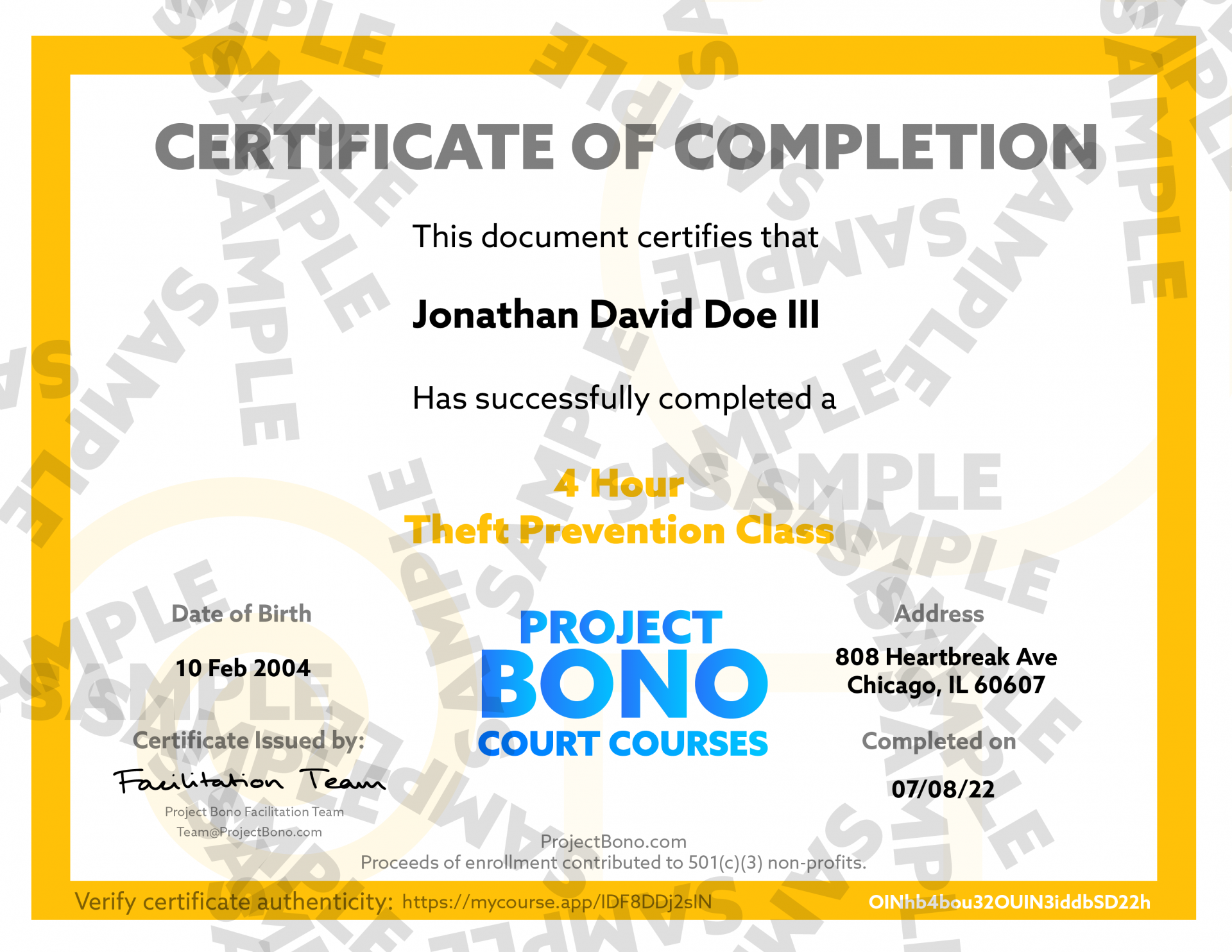
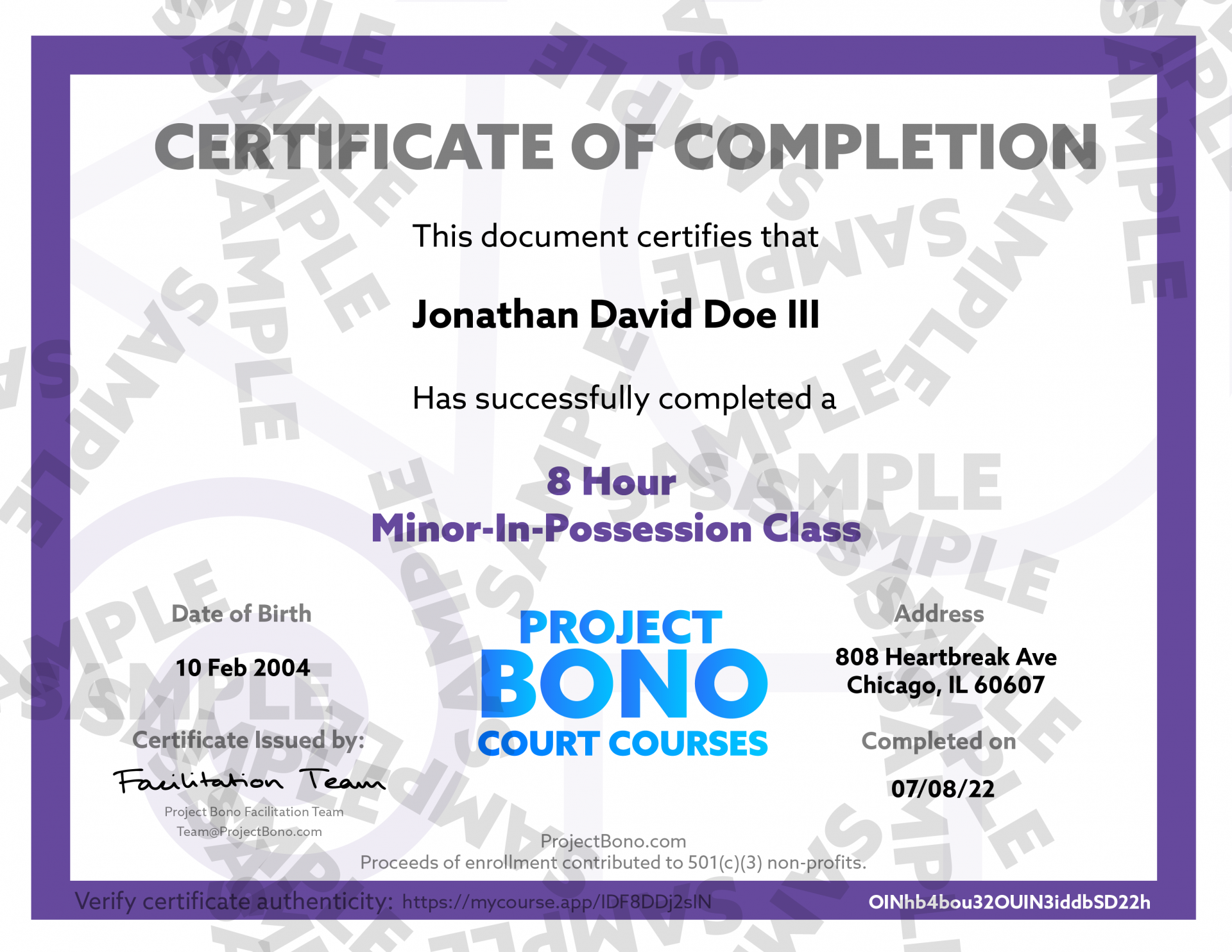
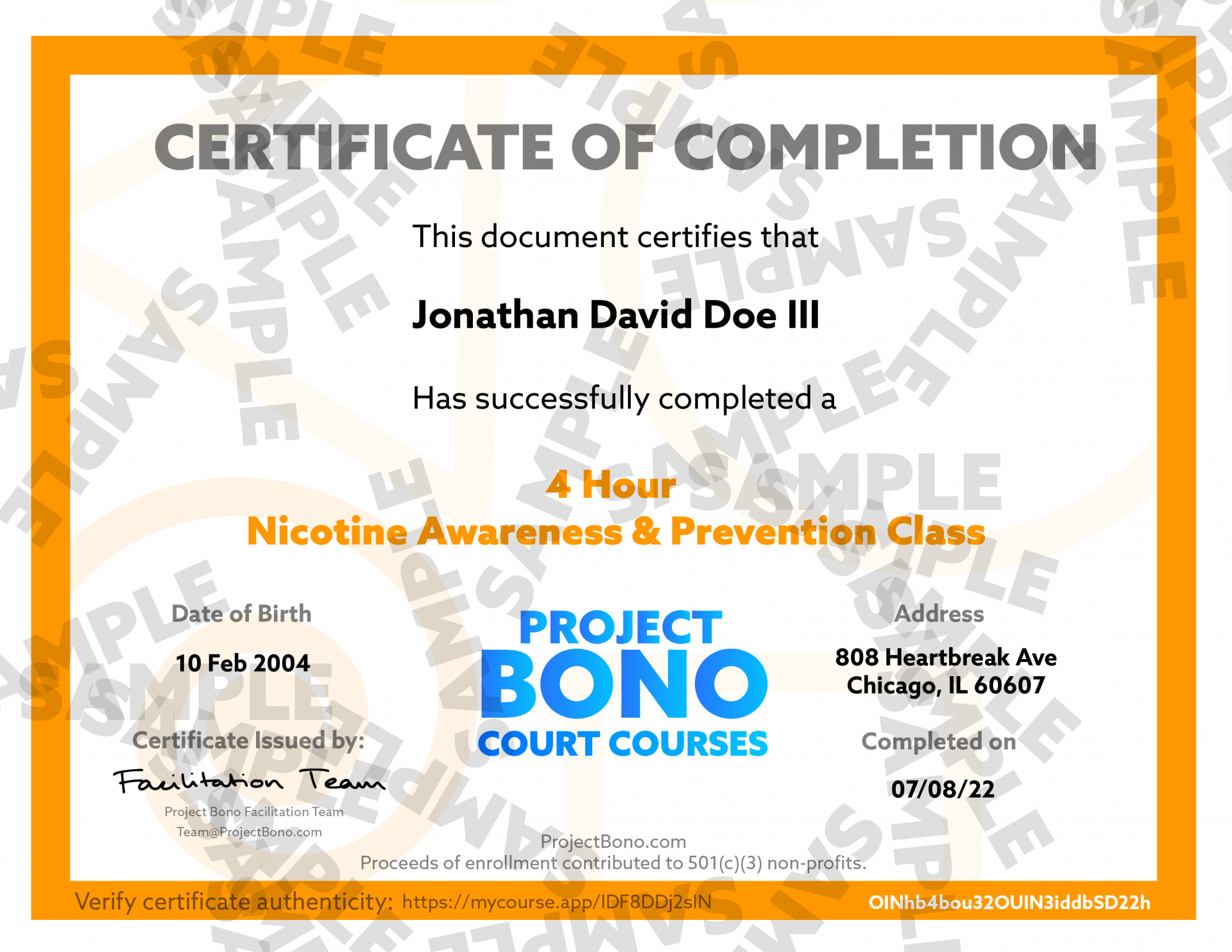
Course updates
Course contents and formatting are subject to improvements.
We are constantly monitoring current scientific and legislative data to provide you with the most accurate information within our courses. When you purchase any of our courses you are entitled to all future versions of the course.
We are constantly monitoring current scientific and legislative data to provide you with the most accurate information within our courses. When you purchase any of our courses you are entitled to all future versions of the course.
PrintableHandouts
Download and print PDF handouts to easily direct students to the correct course and start assigning!
How does Project Bono work?
Project Bono offers correctional education programs that aim to educate first-time and repeat offenders about the risks associated with substance abuse and harmful behaviors.
As you progress through our courses, you'll have access to various forms of media, including videos, to help you understand the material.
Once you've completed the course and met the time requirement, you'll receive a certificate of completion that you can share with your court, school, or employer.
As you progress through our courses, you'll have access to various forms of media, including videos, to help you understand the material.
Once you've completed the course and met the time requirement, you'll receive a certificate of completion that you can share with your court, school, or employer.
One thing that makes Project Bono stand out is that we donate 25% of enrollment proceeds back to the communities that assign our programs.
This means that by assigning our programs, not only are individuals learning valuable life skills and building awareness, but they are also enriching the communities that assign our programs.
This means that by assigning our programs, not only are individuals learning valuable life skills and building awareness, but they are also enriching the communities that assign our programs.
What Programs are offered?
We cover a wide range of topics including Drugs & Alcohol Awareness, Cannabis Education, Minor in Possession (MIP), Nicotine Prevention, Bullying Prevention, Anger Management, Theft Prevention, Truancy Prevention, and more.
We continuously update our programs to reflect current research and trends in substance abuse and other harmful behaviors.
Forgot your Password?
If you forgot your password, you can reset it by clicking on the "Forgot your password?" link on the login page.
If you signed up with an existing social account and the "Forgot your password?" solution doesn't work, you may need to change your password on the existing social account.
If you signed up with an existing social account and the "Forgot your password?" solution doesn't work, you may need to change your password on the existing social account.
Can I take a course on my phone?
Yes!
All of our courses are accessible across any device with a web browser.
All of our courses are accessible across any device with a web browser.
Can I take a course on my phone?
Project Bono is accessible to anyone with a web browser (such as Google Chrome, Safari, Microsoft Edge, etc.), and a stable internet connection. Whether you choose to participate from a desktop computer, laptop, tablet, or smartphone, you should be able to access our programs with ease.
Our website is designed to adjust to your device's screen size and resolution, making it easy to start a course on one device and pick up where you left off on another. If you have any questions about the technology required to participate in our programs, our support team is always here to help.
Our website is designed to adjust to your device's screen size and resolution, making it easy to start a course on one device and pick up where you left off on another. If you have any questions about the technology required to participate in our programs, our support team is always here to help.
What if my certificate is not accepted?
If your certificate of completion is not accepted by a member of the court, counselor, employer, administrator, or any other occupational, educational, or legal assigner, please contact us.
Our certificates come backed with a 30-day acceptance guarantee. If your certificate is not accepted for any reason, please provide us with documented proof of rejection, such as an email or written statement from the assigner.
We always recommend contacting your issuing party before purchasing any of our courses to confirm they will accept your certificate. Please note that refunds in these cases are only granted within the 30-day guarantee period.
How do I request a refund?
If you need to request a refund for any reason, including if your certificate of completion is not accepted by your assignor, you can do so by sending us an email at team@projectbono.com.
To enact our acceptance guarantee, please include in your email a written proof of decline from the assignor that includes a way of reaching them. If the request is within 30 days of your purchase and meets the criteria of our acceptance guarantee, we will process your refund promptly.
Please note that refunds that don't qualify for the acceptance guarantee, such as those requested outside of the 30-day window or for reasons other than non-acceptance by your assignor, are reviewed and issued on a case-by-case basis.
If you have any questions or concerns about requesting a refund, please don't hesitate to contact our customer support team at team@projectbono.com.
Am I able to pause the course?
Yes, participants are able to pause the course and continue at any time, on any device. Our platform is designed to save your progress consistently while you participate in the course, so you can pick up right where you left off. Whether you need to take a break for a few hours or a few days, you can rest assured that your progress will be saved.
We want you to get the most out of our courses and achieve your goals, and that means being able to learn at your own pace and on your own schedule. So go ahead and take a break if you need to - we'll be here when you're ready to continue.
How long does it take to complete a course?
The time it takes to complete a course varies depending on the time requirement you choose. When you enroll in a course, the time requirement will be clearly stated on the course page, along with an estimated completion time based on that requirement.
If you're unsure about which time requirement to choose or have any other questions about course completion time, you should reach out to your assigning party.
What does the certificate look like?
Every certificate generated by Project Bono includes the following information: course title and time requirement, student's name, birth date, address, date of completion, and certificate verification link. This information is unique to each certificate and cannot be duplicated or edited.
We offer certificates in PDF format because it's the most efficient way to send documents over email, while also reducing paper, ink, energy, transportation, and overall costs required to mail a physical copy.
Remember, it's important to submit your certificate of completion to your assignor as soon as possible to avoid any complications. If you have any questions or issues, please contact our support team for assistance.
Hollup.
Who are You?
Acceptance Guarantee
Enhance your assurance with our 30-Day Acceptance Guarantee.
Whenever you enroll in a Project Bono program, you have the peace of mind knowing that our certificate is backed by our Acceptance Guarantee. If your certificate isn't embraced by the assigning entity, we've got you covered.
Simply provide us with a proof of decline, and we'll handle the rest.
Simply provide us with a proof of decline, and we'll handle the rest.
◊ Acceptance Guarantee: Offer is only valid for 30 days from the date of certificate issuance and is available to participants within the U.S. The guarantee is subject to validation of the proof of non-acceptance provided by the enrollee. For detailed information regarding our policy, see support.projectbono.com/acceptance-guarantee.